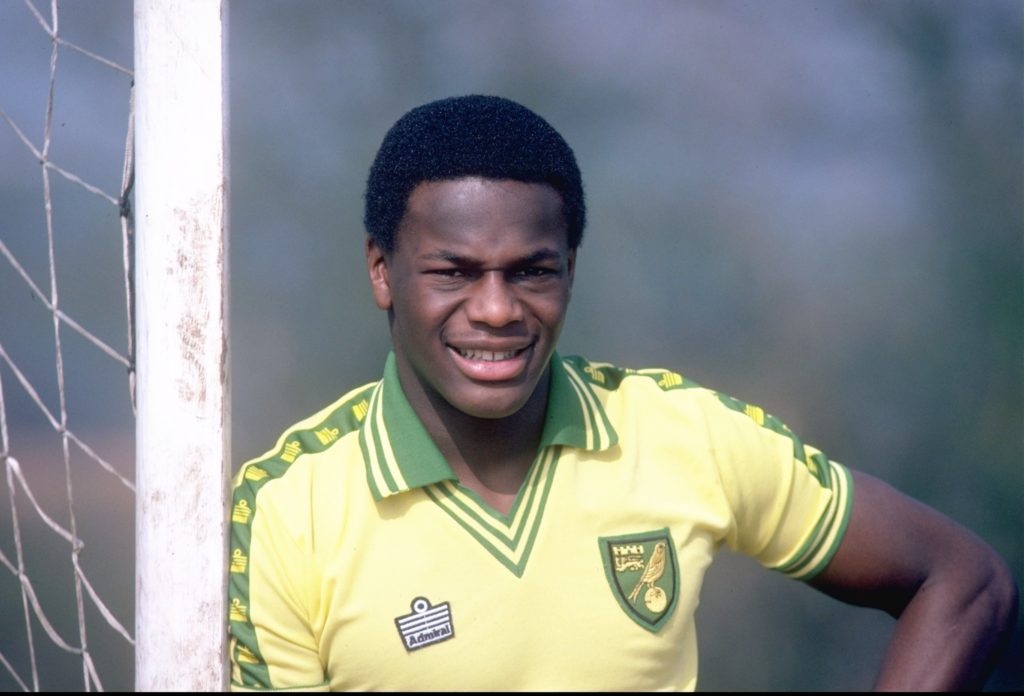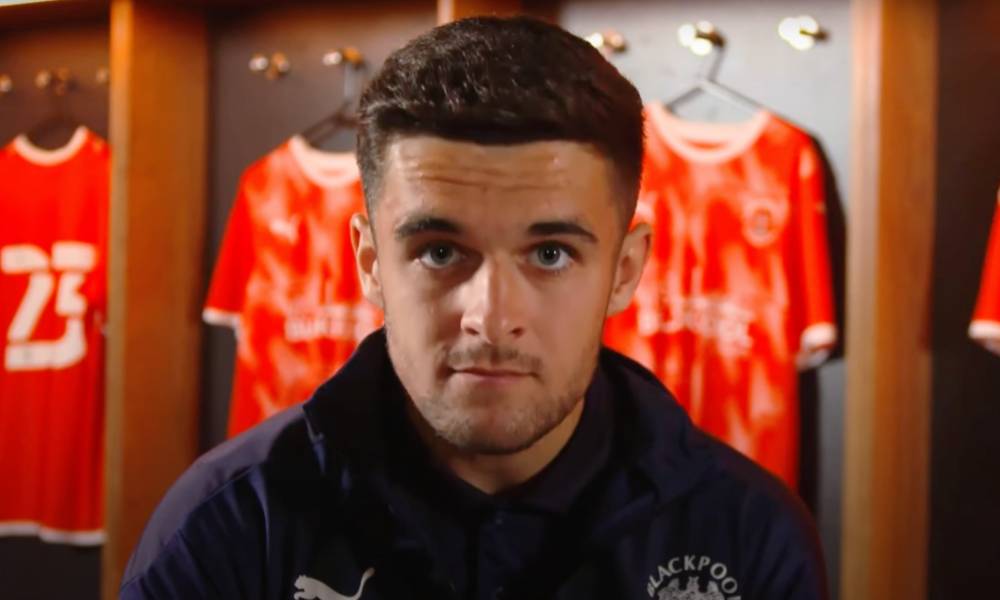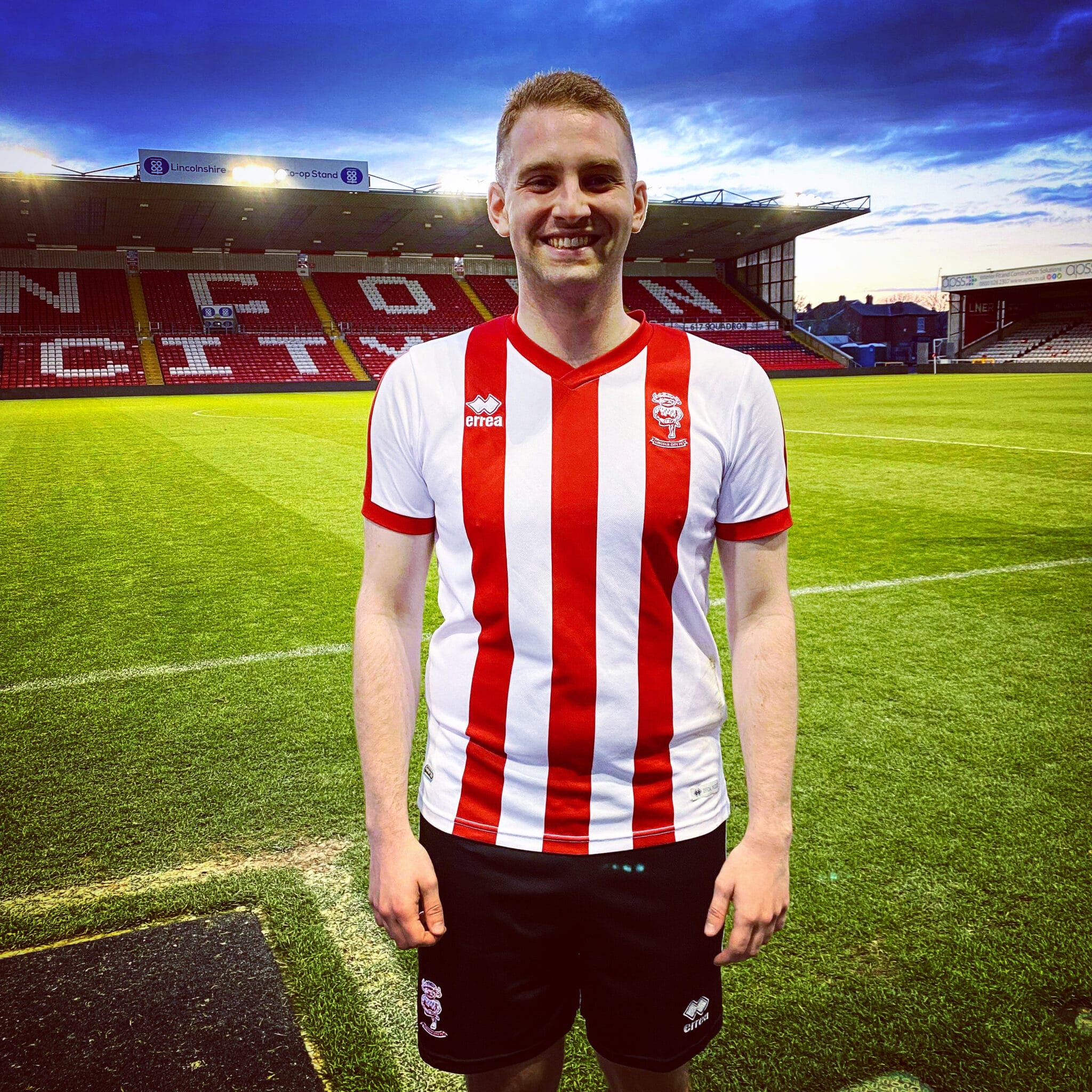Football experts explain why Jake Daniels coming out as gay will change the game forever

Jake Daniels. (Sky Sports/YouTube)
Football fan Jack Duncan was hit by a wave of emotion when news broke that footballer Jake Daniels had come out as gay.
There was something of a media storm on Monday (16 May) when Daniels, a 17-year-old Blackpool footballer, came out in a Sky Sports article.
Up until now, the UK has only had one openly gay active professional male footballer in history – Justin Fashanu, who came out in 1990 and died by suicide in 1998. Other professional male footballers have come out since, but only after retiring from the sport.
Like many men his age, Jack has a complicated relationship with sport. In school, he was a keen rugby player, but eventually quit because he couldn’t cope with homophobic locker-room talk. He was “overwhelmed” when he heard the news because he’s been waiting so long for a moment like this one.
“I felt emotional, quite teary, very similar reaction from all of my friends in sport who are queer as well,” he tells PinkNews. “I think that’s partly because we’ve been waiting for this for so long. I’m 33 years old and we haven’t had a situation like this and a player out and active for 30 years since the tragic case of Justin Fashanu.”

Justin Fashanu of Norwich City. (Allsport UK /Allsport/Getty)
Jake’s coming out is the result of deeper cultural changes that have been happening behind the scenes for some time in football, says Jack Murley, presenter of the BBC’s LGBT Sports Podcast.
Gradually, more people behind the scenes have been coming out, while initiatives like rainbow laces has brought queer visibility onto the pitch.
“You can see from Jake’s statement on the Blackpool website that he was noticing the changes,” Murley tells PinkNews. “He talks about someone like Matt Morton, a player and manager at a grassroots level who came out and shared his story. Jake spotted that and heard Matt’s journey, and that clearly inspired him to share his.”
It’s not a direct line from Justin Fashanu to Jake Daniels
“The reason Jake Daniels has been able to do what he’s done today is because of all these incremental changes that have come along the way that have allowed him to feel comfortable. I think that’s really important. When we look at football, it’s not a direct line from Justin Fashanu to Jake Daniels and nothing in between has changed – there have been changes along the way that have allowed this to happen.”
It’s no secret that football has long grappled with homophobia, especially from fans and within locker rooms.

Football fans are praising Blackpool forward Jake Daniels’ bravery after the footballer came out publicly as gay. (YouTube/Sky Sports Football)
Louise Englefield, director of Pride Sports, explains: “If you look at the research… what they’ve found out across a number of sports is that although people are becoming more accepting of LGBTQ+ people, there’s still a prevalence of homophobic language used around the locker room in men’s sports.
“That kind of casual homophobia isn’t used with homophobic intent particularly, but it’s used as a way of ensuring that young men feel like they belong to a group. It’s a way of othering people who don’t belong to the group and affirming your place as a man in that group. It’s as much a discourse around masculinity as it is around sexual orientation in my opinion.
“So we’ve got the problem that if you’re a professional footballer, in those environments you constantly hear people making homophobic comments, making anti-gay jokes, then you’re bound to feel that football is not a place where you can be an out gay man.”
Zack Leader, a grassroots level footballer with Fedora FC in Lincolnshire, was “bullied” out of the sport as a child before he started playing again in 2019.
He still experiences homophobia – at a recent match against his former team, somebody used an anti-gay slur against him. But he’s noticed a change in recent years.
“When the incident happened, all my teammates were threatening to walk off the pitch if it happened again, so it just shows that there is that support there, but sometimes it takes these incidents for it to really be shown and for people to stand up and say, ‘This isn’t right.’ It takes a bit of solidarity sometimes.”

Zack Leader. (Provided)
Jake Daniels coming out, he says, has “broken down so many barriers”.
“I think every man and his dog is excited about the fact that Jake’s done what he’s done,” Zack says. “It feels like a massive part of history – it feels like a new era for the way football could be.”
It’s worth noting that most Premier League championship teams now have LGBTQ+ supporters groups, proving that queer people are a part of the sport – and they’re not going away anytime soon.
Indeed, Murley is now certain that Jake’s coming out will prompt other high-profile athletes to open up about who they are.
“When you look at the statement Jake put out, one thing he says is that he was influenced by Matt Morton and Josh Cavallo, but also by Tom Daley. I think that’s why this goes wider than football – it’s visibility in general. You can be inspired by a diver even though you’re not a diver yourself. So don’t be surprised if and when a rugby player or a cricket player comes out next, they will tell you that Jake Daniels was their inspiration.
“I think this is a significant moment for football for obvious reasons, but what he’s doing is so much wider than that. It’s hard to put a price tag on it.”
Jake Daniels coming out could pave the way for a new wave of talent
While the future is uncertain, it’s a fact that today, an openly gay man is playing at the highest level of British football – something that hasn’t been the case for three decades.
In his Sky Sports article, Jake Daniels said he scored four goals the day after telling his mother and sister that he was gay.
“It just shows how much of a weight off the shoulders it was and a massive relief,” he added.
It proves just how much potential can be unlocked by being yourself, says Chris Paouros, trustee with Kick it Out, an organisation that works to stamp out homophobia and racism in football.
“I often wonder what talent we might have missed out on by young men not being able to be themselves in football,” Chris says.
“Because of toxic masculinity there’s a stereotype that being gay means ‘weak’, but Jake proves that that’s not the case. This is going to be potentially life-changing for many young men up and down the country.”
Chris hopes the outpouring of love and support Jake has received will show other LGBTQ+ footballers that they too can come out and be embraced.
“Being your authentic self when you’re working makes you perform better. We need to create the conditions in which male professional footballers can come out and can feel welcome. We’ve got a responsibility to create a safe and inclusive environment for everyone.”

